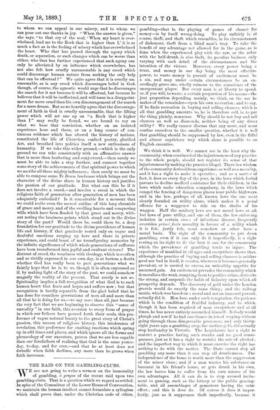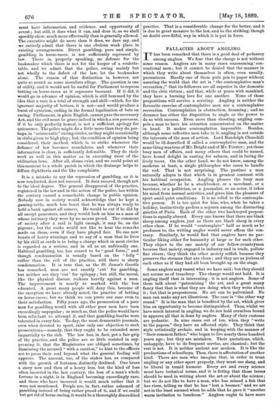• THE RAID ON THE G-AMBLING-CLUBS. ANTE are not going
to write a sermon on the immorality of gambling, it propos of the recent raid upon two gambling-clubs. That is a question which we regard as settled. spite of the Committee of the Lower House of Convocation, we maintain the human intellect cannot formulate a syllogism which shall prove that, under the Christian code of ethics,
gambling—that is, the playing of games of chance for money—is by itself wrong-doing. To play unfairly is,' of course, theft, and theft which resembles, in its circumstanoeh of dishonour, theft from a blind man's tray. To take the benefit of any advantage not allowed for in the game, as is done when the experienced play with the raw, or the sober with the half-drank, is also theft, its peculiar badness only varying with each detail of the circumstances and the intention of the victors. Moreover, every power being a trust, and money in our day being the most effective power, to waste money in pursuit of excitement must 'be a sin, and may under certain circumstances be an ex- ceedingly grave one, wholly ruinous to the conscience of the unrepentant player. But every man is at liberty to spend, or, if you will, to waste, a certain proportion of his means—the just proportion depending mainly, we think, on the use lie makes of the remainder—upon his own recreation ; and to say, if he finds recreation in buying and selling chances, which is all that gambling amounts to, he is therefore evil, is, to put the thing plainly, nonsense. Why should be not buy and sell chances as well as diamonds, neither being of any direct utility ? We really cannot discuss that any more, and must confine ourselves to the smaller question, whether it is well that gambling should be suppressed by law, even in the fitful and almost capricious way which alone is possible to an English executive.
We think it is well. We cannot see in the least why the community, when convinced of the injuriousness of any practice to the whole people, should not register its sense of that injuriousness by making the practice illegal. There is a wisdom of the community derived from experience, as well as a morality, and it has a right to make it operative ; and as a matter of fact, it does so every day of the year, in the laws which forbid parents to decline medical assistance for their children, in'the laws which make education compulsory, in the laws which compel the fencing of dangerous places near public highways, and in the law, perhaps of all known laws the one most clearly founded on utility alone, which makes it a penal offence for a waggoner to ride on the shafts of his waggon. Half the sanitary laws are not moral laws at all, but laws of pure utility, and one of them, the law enforcing isolation in certain cases of infectious disease, frequently overrides primd facie morality in favour of a utility whieh it is felt, justly felt, must somehow or other have a moral basis. The right of the community to put down gambling, even if it can only do it imperfectly, is a right resting on its right to do the best it can for the community which the prevalence of gambling tends to injure. The experience of mankind in all ages and everywhere shows that, although the practice of buying and selling chances is neither good nor bad in itself, it creates, wherever it becomes generally prevalent, or is carried to excess, an unhealthy appetite for unearned gain. An excitement pervades the community which demoralises the weak, tempting them to positive crime, distra:dts the strong, and suspends the habit of industry upon which all prosperity depends. The discovery of gold under the London gravels would do exactly the same thing ; and the railway mania, which was based on a moral and not an immoral pursuit, actually did it. Men lose, under such temptation, the patience which is the condition of fruitful industry, and to which, though it has been required of man everywhere and at all times, he has never entirely reconciled himself. Nobody would plough and sow if he had one chance in ten of reaping without going through those disagreeable processes; and only thirty- eight years ago, a gambling crop, the surface gold, did actually stop husbandry in Victoria. The Legislature has a right to restrict a practice having such results and no good conse- quences, just as it has a right to restrict the sale of alcohol ; and the imperfect way in which it must exercise the right has nothing to do with the matter. The State cannot stop all gambling any more than it can stop all drunkenness. The independence of the home is worth more than the suppression of the minor vices ; and if a man wastes his substance on baccarat in his friend's house, or gets drunk in his Own, the law leaves him to suffer from his own misuse of his own advantages. All it can do is to stop avowed incite- ment to gaming, such as the lottery or the public gaming- table, and all assemblages of gamesters having the Bailie effect ; and this it does do. Of course it does it imper- fectly, just as it suppresses theft imperfectly, because it must have information, and evidence, and opportunity of arrest ; but still, it does what it can, and does it, as we shall speedily show, much more effectually than is generally allowed. The executive might do more than it does, we dare say, and we entirely admit that there is one obvious weak place in existing arrangements. Direct gambling, pure and simple, gambling in horse-races, is not sufficiently repressed by law. There is, properly speaking, no defence for the bookmaker which there is not for the keeper of a roulette- table, and we admit that the police, owing mainly but not wholly to the defect of the law, let the bookmaker alone. The reason of that distinction is, however, not quite so sound as some moralists allege. The question is one of utility, and it would not be useful for Parliament to repress betting on horse-races as it represses baccarat. If it did, it would go in advance of opinion, which is still bemused by the idea that a race is a trial of strength and skill—which, for the ignorant majority of bettors, it is not—and would produce a burst of cynicism, ending in the formal legalisation of bets on racing. Parliament, in plain English, cannot pass the necessary Act, and the evil must be grave indeed in which a non possumus, if it be only perfectly honest, is not a sufficient apology for quiescence. The police might do a little more than they do, per- haps, in "aristocratic" racing circles, as they might occasionally in clubs given to high play ; but, the condition of opinion being considered, their method, which is to strike whenever the defiance of law becomes scandalous, and whenever their information is clear, is sufficiently defensible. They do their work as well in this matter as in executing most of the utilitarian laws. After all, slums exist, and we could point at this moment to a whole parish in which the drainage helps to diffuse diphtheria and the like complaints.
It is a mistake to say the repression of gambling, as it is now conducted, does not succeed. It does succeed, though not to the ideal degree. The general disapproval of the practice, registered in the law and in the action of the police, has within the century caused a remarkable change in public opinion. Nobody now in society would acknowledge that he kept a gaming-table, much less boast that he was always ready to hold a bank against all comers. He would be cut if he did by all except gamesters, and they would look on him as a man of whose intimacy they were by no means proud. The comment of society after a raid is light enough, it may be, on the pigeons ; but the rooks would not like to hear the remarks made on them, even if they have played fair. No one now boasts of heavy winnings, and to say of a man that he lives by his skill at cards is to bring a charge which in most circles is regarded as a serious, and in all as an unfriendly one. Habitual gambling, too, has ceased to be "good form ;" and though condemnation is usually based on the " folly " rather than the evil of the practice, still there is sharp condemnation. It is true that, as the St. James's Gazette has remarked, men are not exactly cut for gambling, but neither are they cut for epilepsy ; but still, the moral, like the physical disease, reckons heavily against a man. The improvement is nearly as marked with the less educated. A great many people will deny this, because of the exception we have already noted, the practice of betting on horse-races ; but we think we can prove our case even to their satisfaction. Fifty years ago, the prosecution of a poor man for gambling would with all other poor men have been exceedingly unpopular ; so much so, that the police would have been reluctant to attempt it, and that gambling-booths were tolerated in every fair. To-day, the most democratic journals, even when devoted to sport, raise only one objection to such prosecutions,—namely, that they ought to be extended more impartially to the rich. The law has, in _fact, got a fair grip of the practice, and the police are so little resisted in sup- pressing it, that the Magistrates are obliged sometimes, by dismissing the accused "with a caution," to hint to the officers not to press their zeal beyond what the general feeling will approve. The amount, too, of the stakes has, as compared with the growth of fortunes, distinctly declined. One hears a story now and then of a heavy loss, but the kind of loss often incurred in the last century, the loss of a man's whole fortune in a night, is in England becoming exceedingly rare, and those who have incurred it would much rather that it were not mentioned. People are, in fact, rather ashamed of gambling instead of being rather proud of it, and if we could but get rid of horse-racing, it would be a thoroughly discredited
practice. That is a considerable change for the better, and it is due in great measure to the law, and to the striking, though no doubt over-fitful, way in which it is put in force.



































 Previous page
Previous page